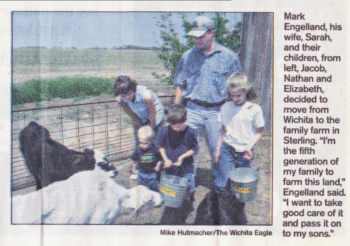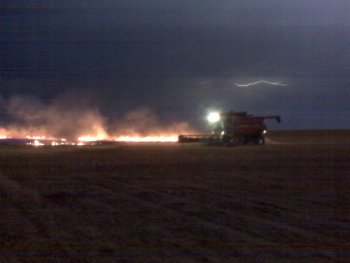 Engelland Farms encourages you to reflect for a moment today about the sources of your food and fiber. As occupations have become more specialized it seems that folks are ever further removed from the source of these staples. One objective of our website is to help folks reconnect with heartland agriculture. Click on the button at the left to learn more about National Ag Day.
Engelland Farms encourages you to reflect for a moment today about the sources of your food and fiber. As occupations have become more specialized it seems that folks are ever further removed from the source of these staples. One objective of our website is to help folks reconnect with heartland agriculture. Click on the button at the left to learn more about National Ag Day.
Help wanted
 Engelland Farms is seeking experienced farm help for a full-time position with highly competitive wages. Successful applicants will demonstrate proficiency in operating a self-propelled sprayer, seeding and harvesting equipment. Applicants should also be able to operate a semi and possess a CDL or the driving record and skills to obtain a CDL in timely manner. Ability to maintain and repair equipment is a must. Welding proficiency is highly desirable. Experience with cattle is an advantage but not required. Physical health and strength requirements consistent with farm work. Engelland Farms is a smoke-free and alcohol-free work place. Submit inquiries regarding this position to mark@engellandfarms.com.
Engelland Farms is seeking experienced farm help for a full-time position with highly competitive wages. Successful applicants will demonstrate proficiency in operating a self-propelled sprayer, seeding and harvesting equipment. Applicants should also be able to operate a semi and possess a CDL or the driving record and skills to obtain a CDL in timely manner. Ability to maintain and repair equipment is a must. Welding proficiency is highly desirable. Experience with cattle is an advantage but not required. Physical health and strength requirements consistent with farm work. Engelland Farms is a smoke-free and alcohol-free work place. Submit inquiries regarding this position to mark@engellandfarms.com.
Banner images
Some have asked about the banner images on this website. The logo was created by Mark’s wife and business partner, Sarah Engelland. The photos are various scenes from Engelland Farms operations over the years. The banner images are collected in the gallery below. Click on an image to see the full-size version.
Celebrating Ag Day
Wheat harvest lightning strike
Harvest is always an exciting time, but we had more excitement than we wanted last night. A lightning strike ignited wheat stubble adjacent to yet-to-be-harvested wheat. The harvest crew immediately called for the fire trucks, but with the wind blowing 50mph Mark decided to cut a fire break with the combine. One of the guys took the picture below which was published on the Channel 12 KWCH “storm shots” web page. Thanks to Mark’s fire break, favorable wind direction and a prompt response by the Sterling Volunteer Fire Department everything turned out OK.
Back to the farm – 2003
The following article which appeared in the 10 May 2003 edition of the Wichita Eagle highlights the importance of family at Engelland Farms.
Chasing dreams often means making hard, but worthwhile, choices
by Sharon Hamric
A year ago, Mark Engelland stood at a fork in the road. Torn by deeply rooted but opposing passions, he knew his decion would realign his family’s future.
He loved teaching chemistry at Trinity Academy, the Christian high school where he coached the soccer team to the 2001 Class 3A championship. After eight years, it would be hard to leave his students and soccer players.
Yet his heart yearned to plow the Sterling farm settled by his great-great-grandfather.
“It was time to decide,” said Engelland, 36, “My dad was getting to the place where he either had to downsize and sell out or upsize and make it profitable for two families.”
Neither of Engelland’s brothers wanted to take on the risks of farming for a living. Both are engineers who live out of state.
“I grew up on a tractor and always loved farming,” Engelland said. “I couldn’t wait to come back here to farm in the summers. The kids loved it, but it was still a tough decision. It’s not a steady paycheck like teaching.
“Farming is risk management. You can work from dawn to dusk and lose it all. Last year we had a hailstorm, and some of our best wheat was gone.”
He misses the people and the interaction from school, but he doesn’t miss grading stacks of papers and filling out grade cards.
Last spring, Mark told Trinity he wouldn’t be returning. He and Sarah put their house on the market.
Sarah, 34, cast her vote to move to the farm. The city girl from Wichita, who met Mark at the University of Kansas, saw the opportunities for her children. Though her kids moved farther away from their Aunt Kathy and from Sarah’s parents, Jim and Marilyn Manweiler, they live just across a soybean field from Mark’s parents.
“It hasn’t been easy,” Sarah admitted. “It’s a long way to the store to buy a gallon of milk. You really have to plan ahead.”
“The kids miss playing with their neighborhood friends, but they’re learning a lot about responsibility by raising their own calves. Nathan thinks he’s ready to drive the tractor.”
“It’s so peaceful and so beautiful out here, but everything’s a trade-off. We get to see Mark for lunch, then we get stuck in the mud. I’m just thankful Mark’s family is so close.”
 After a decade away from full-time farming, there was much catching up to do regarding farm technology. His dad and several high school pals who’ve also come home to farm became his teachers.
After a decade away from full-time farming, there was much catching up to do regarding farm technology. His dad and several high school pals who’ve also come home to farm became his teachers.
Engelland grows corn, wheat, grain sorghum, soybeans and sunflowers and tends a herd of cows.
“There was so much more to learn about fertilizer, about crops and everything else,” he said. “I’m the fifth generation of my family to farm this land. I want to take good care of it and pass it on to my sons.”
Nathan, 6, definitely plans to be a farmer. He spends his free time in the barn with the calves. Elizabeth, 10, and Jacob, 19 months, are undecided about career plans.
Heavy rains last fall caused delays in digging the basement and in the delivery of their two-story modular home. Now the family is settle into their cozy new nest.
Instead of staying up late to grade tests, Mark is out in the barn checking on cows ready to deliver spring calves. His daily routine is determined not by a school bell, but by the weather, crop conditions and the needs of his cows.
“It’s been my dream, but I had to make sure it would work for my family. On the farm, you’ve go to be prepared for anything at any hour.”
On the Engelland farm just north of Sterling, the hours seep by like molasses. Days fly by. Calves escape through fences. Crops ripen. Tractors break down. Too quickly, too much rain becomes too little rain.
Each night, as Mark and Sarah tuck their little ones into bed, they say a prayer of thanksgiving for this new beginning.
Back to the farm – 1975
The following article which appeared in an October 1975 edition of the Sterling Bulletin highlights the importance of family at Engelland Farms.
Once A Farmer…
Back to the Soil for Missile Engineer
What’s a missile engineer doing in the cab of a farm tractor east of Sterling preparing ground for fall planting? It’s difficult for John Engelland to explain. He feels that he now is doing something that matters after spending about nine years developing the mechanics of a U.S. Air Force training target system.
 Until September of last year, John was one of the development engineers on the Air Force’s High Altitude Supersonic Target (HAST) being fabricated at Beech Aircraft in Wichita and test flow at Eglin Air Force Base, Fla. He was promoted to program manager before he left.
Until September of last year, John was one of the development engineers on the Air Force’s High Altitude Supersonic Target (HAST) being fabricated at Beech Aircraft in Wichita and test flow at Eglin Air Force Base, Fla. He was promoted to program manager before he left.
It was a challenging assignment but the years on the drawing board and endless hours spent commuting to Florida for a test-firing lasting only minutes were sometimes less than satisfying.
He was living in Rose Hill at the time, a few miles south of Wichita. Farming in the evenings and on weekends seemed to put things in proper perspective again. He grew up in Sterling and his rural background never paled, even after years in quest of an engineering degree an stature as a designer.
“It really wasn’t much of a change,” John said of his decision to leave Beech and return to near where his great-grandfather had homesteaded. “I was an engineer full time and a farmer part time. Now, I’ve just changed my priorities.”
John believes that he has acquired the best of two worlds. He admits that he probably always wanted to be a farmer, at heart, and he has retained his engineering credentials by performing outside consulting work in heating and air conditioning.
Now, he’s working 1,300 acres in wheat, alfalfa, milo and corn plus a dairy and cattle operation. “I still feel like I’m on vacation.” he laughed, explaining that he now has time to spend with his boys – Brent, who is in kindergarten; Shawn, in the sixth grade, and Mark a third grader. John and his wife can plan on doing things together with the knowledge that he won’t be away from home for days and weeks at a time.
“it’s only work if you’d rather be doing something else.” John admits that the statement isn’t his, but it fits his lifestyle.
He was leafing through a magazine several years ago on an airliner while returning from a test firing in Florida when the phrase caught his eye. The thought had worlds to say to a man who wasn’t sure he wanted to make a career out of sitting through meetings with vice presidents and listening to military reviews.
“I figured out at one time that I spent about 500 hours of overtime in six months at the HAST project that I knew I’d never be paid for. That was time away from my family, and the boys were growing up fast.
“Things seem to be in a lot better perspective now. I’m working harder and perhaps longer – but it’s work I like and it’s mine.”
He received word last July 4 from a friend who called to say that the HAST has made its first successful flight. The message was relayed by his family via CB radio in his tractor cab.
A farmer with an engineering background has to chuckle and shake his head with design of some machinery components, John confesses. But such discomfort passes as he watches the earth turn behind his cultivator and his boys busy with their 4-H projects.
And his wife, Judy, who grew up here, has not objected to being back in Sterling.


